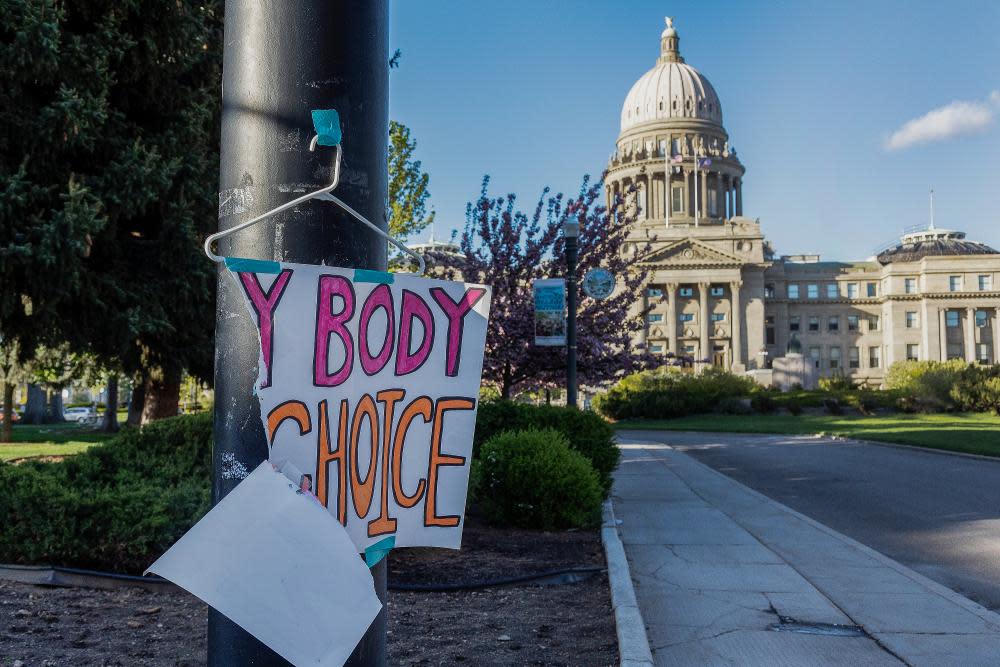Judge blocks Idaho law stopping adults from helping minors seeking abortion

A federal judge has temporarily blocked an Idaho law that prohibits adults from helping minors get an abortion.
While abortion is still prohibited in Idaho with very narrow exceptions, this week’s court order marks a victory for abortion rights advocates in the state who say the now-blocked law is unconstitutional.
Related: Abortion rights across the US: we track where laws stand in every state
“This lawsuit is not about the right to an abortion. It is about much more,” said US district magistrate Debora K Grasham in her order this week. “Namely, long-standing and well recognized fundamental rights of freedom of speech, expression, due process, and parental rights. These are not competing rights, nor are they at odds.”
Under the statute, anyone who helps a minor get an abortion could be sentenced to two or five years in prison. Adults are also prohibited from “recruiting” a pregnant minor, a term that reproductive justice advocates said is confusing and vague.
“The judge seemed to agree that this is a confusing Idaho law that does not draw clear lines between what is legal and what will land you in prison,” said Kelly O’Neill, a lawyer at Legal Voice, an advocacy group representing the plaintiffs challenging the Idaho statute.
“We could not get a clear answer on what ‘recruiting’ actually means,” O’Neill added.
Signed by Governor Brad Little in April, the controversial law marked the first major push since the fall of Roe v Wade to explicitly block people from traveling across state lines to access abortion care. Idaho borders Oregon and Washington, two states where the procedure is legal.
“The big win here is being able to give out information, to tell people their full range of options, then give them the resources to make the decision about a pregnancy,” said Lourdes Matsumoto, the only individual plaintiff in the case.
Matsumoto is an Idaho attorney who works with survivors of domestic and sexual violence, many of whom are minors.
Before the law’s passage in April, she encountered cases where a child is impregnated through rape “roughly once per month”.
Since the law’s passage, pregnant victims have been more hesitant about reaching out for help and information, according to Matsumoto. The Idaho law created a culture of fear and confusion, restricting Matsumoto’s ability to tell vulnerable young people about reproductive health resources.
“Domestic violence shelters, doctors who work with these young pregnant patients, advocates, everyone is more protected thanks to this order,” she said. “You can look at the 17-year-old girl standing in front of you and say, ‘Here are all the options available to you as a person in Idaho, here’s all the ways I can support you.’”
Many Idaho doctors vocalized concerns about the statute earlier this year, before the law’s passage. Bonner General Health, a hospital in northern Idaho, said in a statement released last March that it could no longer offer labor and delivery services, citing a shortage of doctors.
“The Idaho Legislature continues to introduce and pass bills that criminalize physicians for medical care nationally recognized as the standard of care,” the statement said. “Highly respected, talented physicians are leaving. Recruiting replacements will be extraordinarily difficult.”
Matsumoto and the other plaintiffs hope this week’s court order will offer doctors some peace of mind. Still, she worried about what might happen in January, when the Idaho legislature will reconvene.
“I worry that the legislature might go ahead and amend the statute, addressing some of the concerns that the judge talked about, adding ‘clarity’ but making the law even more draconian,” Matsumoto said, adding that abortion rights advocates in Idaho will keep a close eye on the statehouse come January.
“I am so relieved and thrilled about the injunction, but this was one battle, not the war.”


